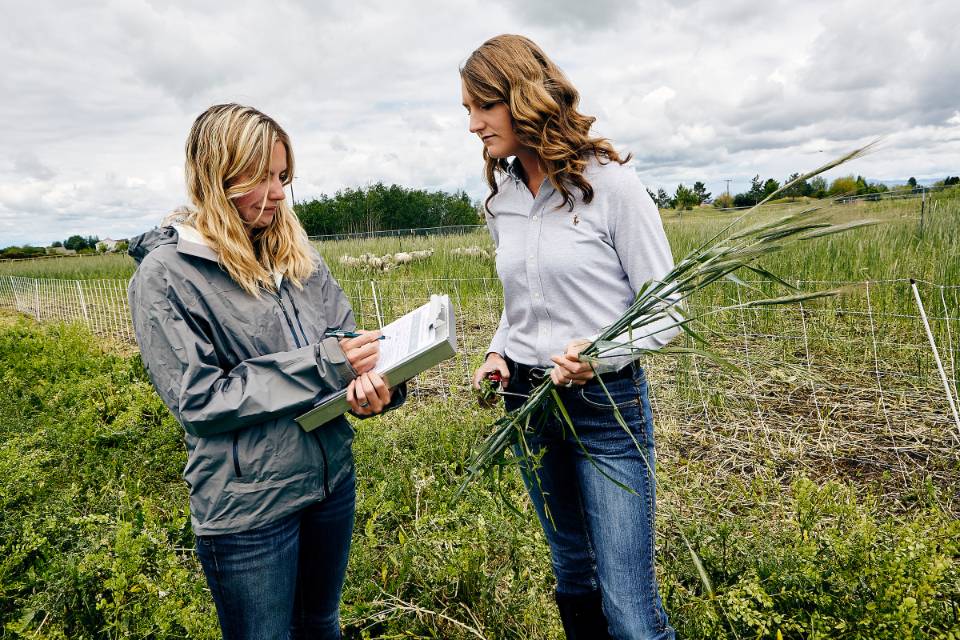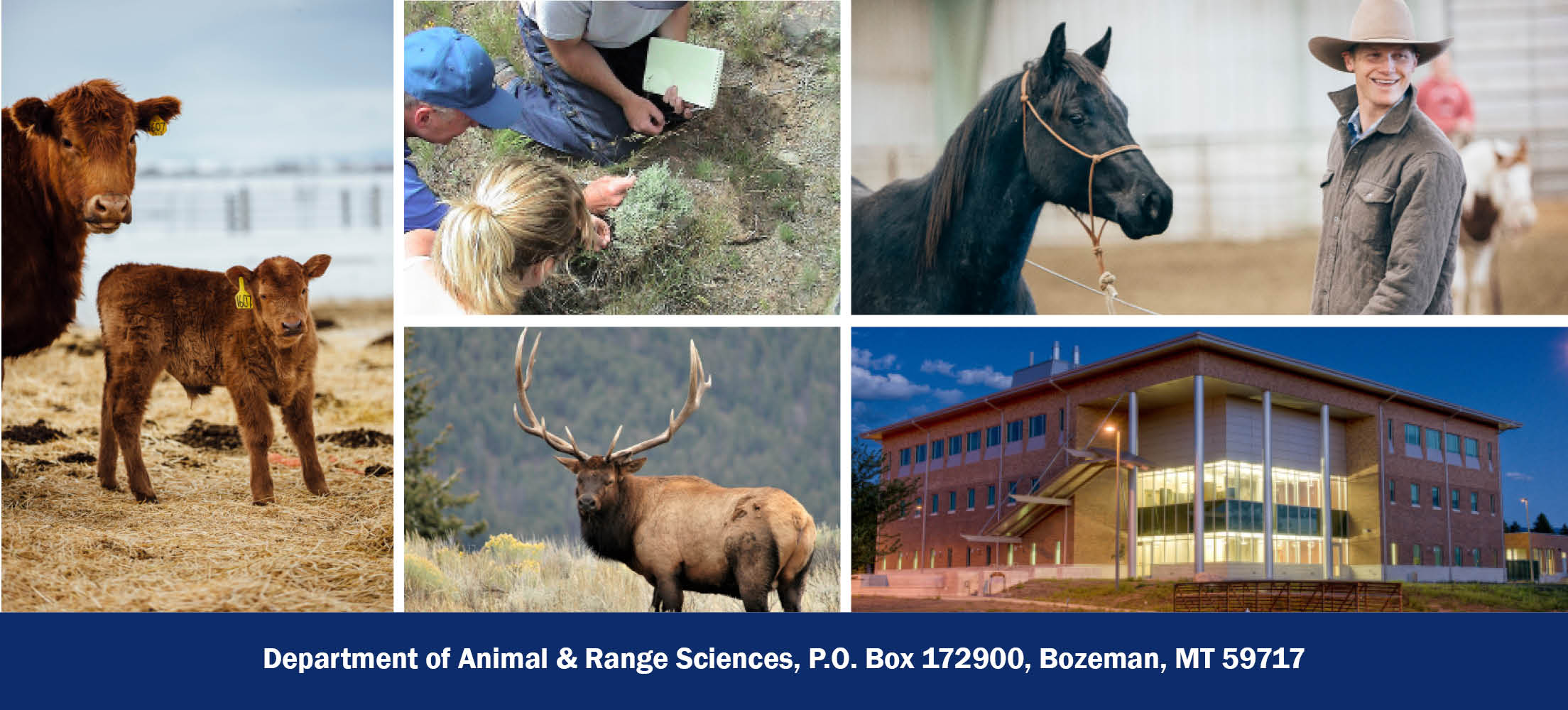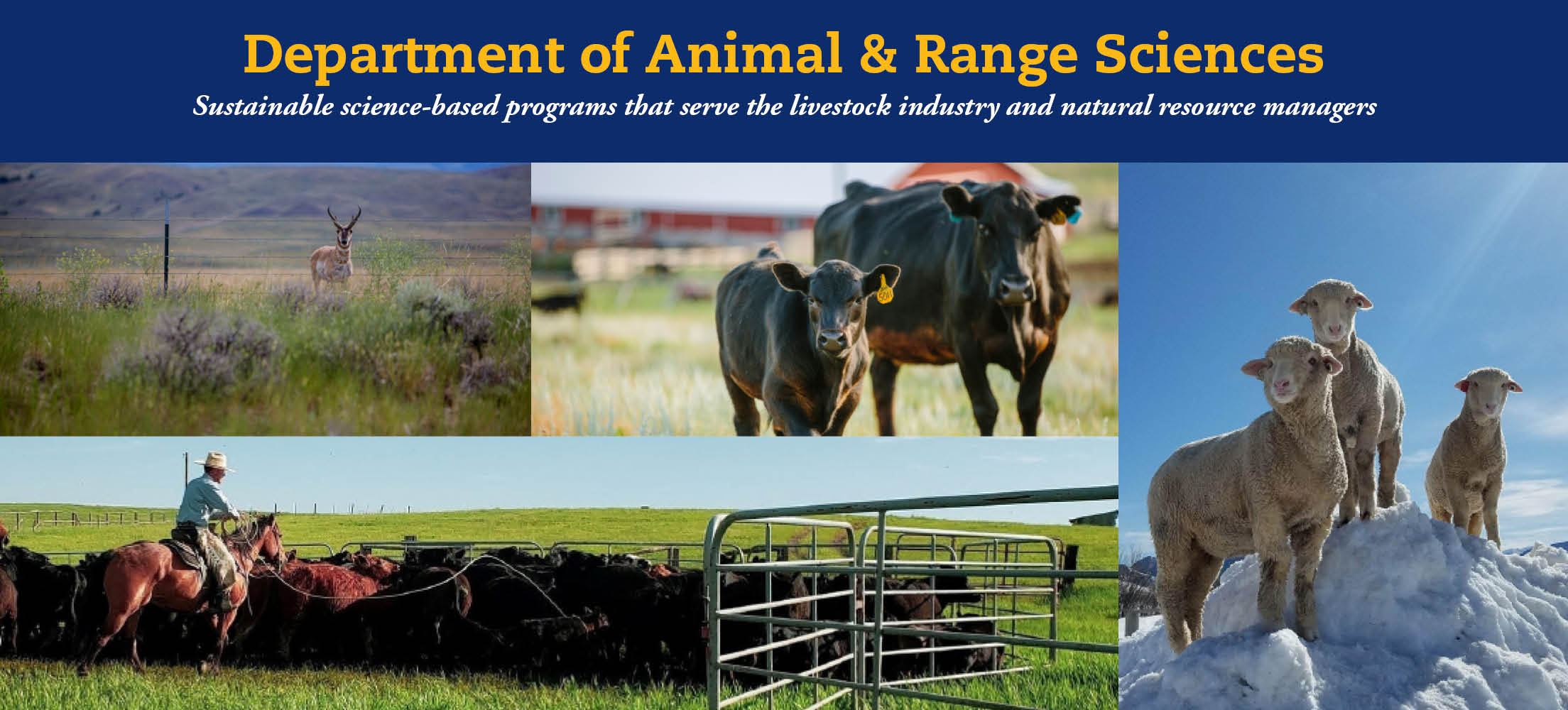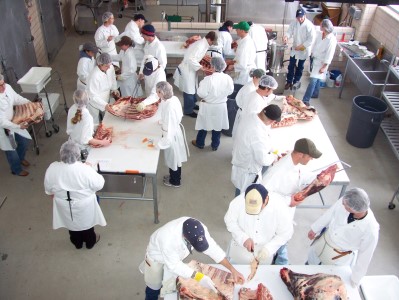Animal and Range Sciences Brochure
Download our brochure in a printable format.
We realize choosing an academic path can be challenging. That’s why our well-respected programs are designed to introduce you to a wide range of agricultural courses and options in animal science, natural resources and rangeland ecology, and ranching systems that can serve as a springboard to many opportunities — some you may have considered and others you might not have known were possible.
COMMITMENT
Our department is dedicated to all aspects of animal science, natural resources and rangeland ecology, and ranching systems, and we transfer this dedication to our students. Our knowledgeable, engaged and enthusiastic faculty members prioritize education while encouraging personal growth and skill-building through hands-on learning experiences, internships, and student clubs and organizations. As a student, you will appreciate our low student-to-instructor ratio that provides an exceptional learning environment and a better chance for us to get to know you and how we can help you achieve your goals.
OPPORTUNITY
We believe learning should extend beyond the classroom. As a student in any of our degree programs, you will benefit from our investment in field laboratories, farms, and facilities where you will apply what you learn behind your desk to hands-on, real-world experiences. We cultivate and maintain close working relationships with other land-grant universities, farms and ranches, and regional, state and federal agencies, including the National Park Service, USDA Forest Service, Montana Fish Wildlife and Parks, Bureau of Land Management, and Natural Resources Conservation Service. These connections provide ample and varied opportunities for our students to investigate and formulate solutions to real-world issues, and have led our students to internships, summer and permanent employment, and lifelong careers.
RESEARCH
As Montana’s land-grant institution, we emphasize teaching, research and outreach. This combination allows our students direct access to cutting-edge research and technology, and provides myriad opportunities to actively participate in varied statewide research and outreach programs within the department and associated programs that serve the livestock industry.
Degree Programs
Bachelor of Science in Animal Science
As a student in the Animal Science program, you will gain a firm foundation in biological and natural sciences, animal breeding and genetics, reproduction, physiology, nutrition and livestock production and management. We also offer specialized course work that incorporates sustainable resource management and wildlife-livestock interactions. Course work can be directly applied to production environments in the western United States. Options leading to a bachelor of science degree in Animal Science allow you to customize your curriculum to meet your goals.
The Livestock Management and Industry Option stresses the application of scientific principles to livestock production. These principles may integrate elements of economics, range ecology, genetics, physiology, nutrition and other disciplines to develop sustainable livestock production systems and address industry issues. This option focuses on sustainable livestock systems, business, and management skills as they relate to livestock enterprises and production service industries.
The Equine Science Option combines science and technology with practical elements of equine management to meet the growing needs of the equine industry. Required science-based equine courses include nutrition, reproduction, form-to-function, lameness and management. Economics and business management courses are integral to this option.
The Science Option emphasizes greater depth in the basic biological sciences. Required classes in this option allow you to prepare for pre-professional programs such as veterinary and human medicine. Some students in this option continue their education in graduate school. You can customize your program to emphasize physiology, nutrition or genetics.
Students from other majors can complement their studies with a minor in Animal Science. Students take introductory and advanced animal science classes to strengthen their knowledge of the industry.
A degree in Animal Science prepares you to manage livestock enterprises or for employment with nutrition companies that produce and market animal feed, health products, and other service products. You will be prepared for careers with a variety of organizations, including breed associations, commodity groups, livestock publications and government agencies.
The Department of Animal and Range Sciences at Montana State University offers a Master of Science degree and a Doctor of Philosophy degree in Animal and Range Sciences. Both the M.S. and Ph.D. degree programs require students to choose an emphasis in either Animal Science or Range Science. Additionally, the department is a program participant in the cross-college Ecology and Environmental Sciences Doctoral Program.

Bachelor of Science In Natural Resources and Rangeland Ecology
Accredited by the Society for Range Management
The multidisciplinary Natural Resources and Rangeland Ecology degree program teaches students to balance the different uses of an ecosystem to sustain resources and serve all users, whether they are human or (wild or domestic) animal. Faculty members who instruct this program present a holistic approach to interactions among rangeland and ecosystem components.
As a student in this program, you will learn to integrate and apply concepts from soil science, plant ecology, ungulate nutrition, and community dynamics to develop appropriate management systems. Ultimately, you will learn to apply that knowledge to manage natural resource systems. You can customize your degree program by selecting one of two options.
The Rangeland Ecology and Management Option emphasizes balancing science with the needs of a sustainable ecosystem. You will learn to collect natural resource and production information that will allow you to develop a multiuse plan for land resources. You will analyze ecological information and learn to develop flexible plans for areas to have sustainable watersheds, wildlife habitat, recreation, and livestock production.
The Wildlife Habitat Ecology and Management Option offers you an opportunity to study a multidisciplinary approach to managing wildlife, livestock and their habitats. You learn to develop integrated approaches and plans to create or rejuvenate habitat for all classes of wildlife. You will learn how multispecies communities are important to a healthy ecosystem.
The Natural Resources and Rangeland Ecology Minor is a secondary area of academic specialization. A minor in this area complements some MSU majors and expands career opportunities.
Graduates of this program have found careers with regional, state and federal agencies, including the U.S. Forest Service, Bureau of Land Management, Natural Resources Conservation Service, wildlife agencies, conservation groups, energy companies, and environmental consulting firms, among others. Other graduates of this program have leveraged their undergraduate degrees to pursue graduate education.
The Department of Animal and Range Sciences at Montana State University offers a Master of Science degree and a Doctor of Philosophy degree in Animal and Range Sciences. Both the M.S. and Ph.D. degree programs require students to choose an emphasis in either Animal Science or Range Science. Additionally, the department is a program participant in the cross-college Ecology and Environmental Sciences Doctoral Program.

Bachelor of Science in Ranching Systems
The Ranching Systems degree in the Dan Scott Ranch Management Program is designed to meet the growing need for qualified ranch managers to steward the large landscapes of the northern Great Plains and Intermountain West. This interdisciplinary program combines elements of production with management of natural resources, finances and people to equip graduates with the skills and knowledge they need to successfully enter the multifaceted field of ranch management.
Using a systems-level approach, this program integrates course work and experiential learning in animal production, natural resource management, economics and business, as well as applied skills such as effective communication, lifelong learning and critical thinking.
The degree utilizes courses taught by subject matter experts in both the College of Agriculture and the Jake Jabs College of Business and Entrepreneurship for a truly integrated education suited to managing the modern ranch.
The Ranching Systems degree offers a highly individualized education experience for an equally highly qualified student. While any student may declare Ranching Systems as a major upon enrolling at MSU, admission to the program’s upper level is limited to 10 students per year to ensure the experience is singularly tailored for each student. Students must apply for admission to the upper level during their sophomore year to graduate with a degree in Ranching Systems.
Once accepted to the program, students are paired with a partner ranch for two consecutive, summer-long internships. These for-credit internships are hosted by exemplary working ranches and provide the hands-on opportunity to effectively bridge the gap between the principles you learn in the classroom and real-world application in ranch management.
During the second summer, students work closely with their host ranch to solve a specific problem or to explore a potential opportunity, allowing them to apply their knowledge and skills in a real-world situation.
The Ranching Systems degree prepares you for a successful career in the ranching industry. Graduates are equally well suited to work for individual- or corporate-owned ranches, management of large investment properties, or to return to the family ranch.

Undergraduate and Graduate Research
Scientists in Animal and Range Sciences are committed to experiential learning and research for undergraduate and graduate students. Course work is applied through lab and field work using proven methods and specialized equipment. You will work alongside faculty researchers to find solutions to relevant issues through experiments and research, and by utilizing our teaching farms, laboratories, and relationships with ranches, government agencies, and other land-grant universities.
Graduate Studies

We offer you the opportunity to extend your education within our department with a Master of Science or Doctor of Philosophy in Animal and Range Sciences, emphasizing Animal Science, Range Science or Biology.
Students completing our graduate programs have found employment with industry, private companies and government agencies, such as Montana Fish Wildlife and Parks, U.S. Forest Service, Natural Resources Conservation Service, and the National Park Service.
Learn more about our graduate programs at: animalrange.montana.edu/degrees-grad.html.



